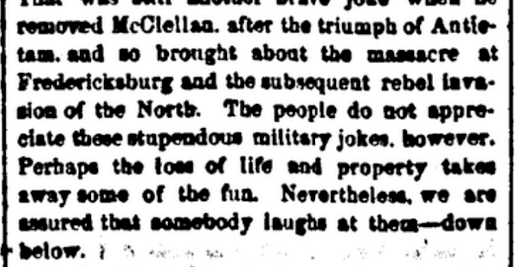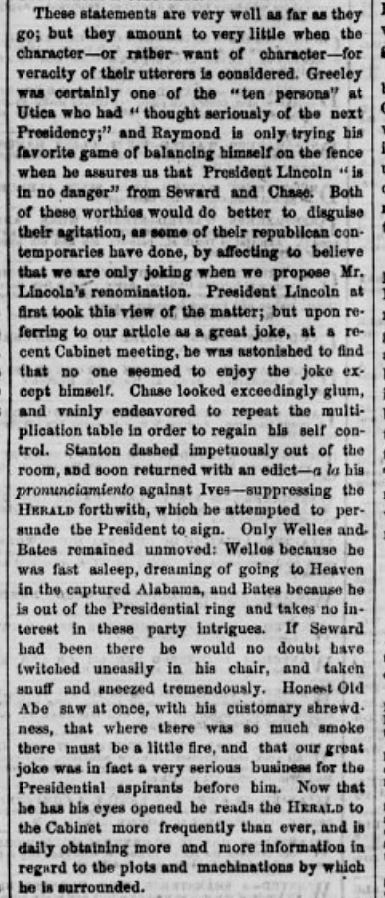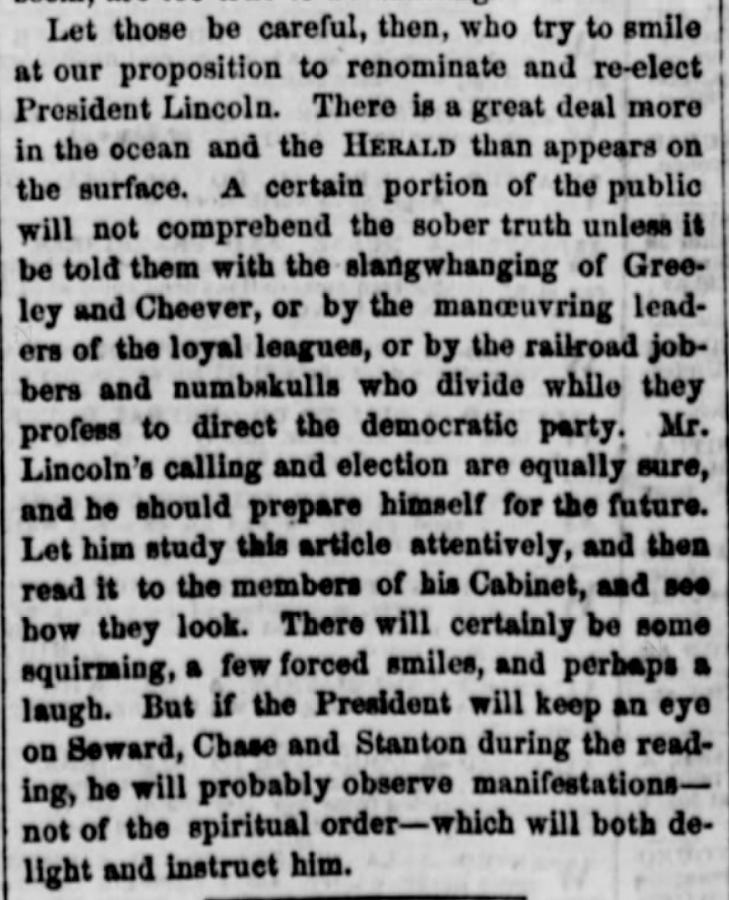Something that has driven me crazy for a while is the claim that the New York Herald’s February 19, 1864 editorial was a “scorching criticism” of Lincoln.
The most commonly quoted lines are:
President Lincoln is a joke incarnated. His election was a very sorry joke. The idea that such a man as he should be President of such a country as this is a very ridiculous joke.
Lincoln was definitely the subject of severe criticism during his presidency, but I could never understand why, by the 1940s, these lines were offered as though they were self-evidently the ultimate insult. It looks like “THE UNPOPULAR MR. LINCOLN” by J. G. Randall had a lot to do with it.
Ruth Painter Randall (his wife) wrote in her biography of Mary Lincoln:
Few passages could be more belittling than the following, published early in '64: "President Lincoln is a joke incarnated. His election was a very sorry joke. The idea that such a man as he should be the President of such a country as this is a very ridiculous joke....His title of 'Honest' is a satirical joke. The style in which he winks at frauds...is a costly joke."
From a letter to the Washington Post from the 1990s:
Our 16th president was criticized more relentlessly and viciously than any other White House occupant before or since. He was routinely attacked in print as, among other things, a traitor, baboon, beast, clown, tyrant, liar and murderer….
Being called a traitor, a beast, a tyrant, a murderer, or even a liar seem far graver to me, but the Post gives only one specific example of a “vicious” attack:
The New York Herald opined during the 1864 presidential election year, in a telling example of this type of journalistic invective, "President Lincoln is a joke incarnate. His election was a very sorry joke. The idea that such a man as he should be President of such a country is a very ridiculous joke. . . . His intrigues to secure a nomination and the hopes he appears to entertain of a re-election are, however, the most laughable jokes of all.
J. G. Randall himself wrote that the Herald doled out the most “crushing sarcasm,” and quoted more of the editorial.
President Lincoln is a joke incarnate. His election was a very sorry joke. The idea that such a man as he should be President of such a country as this is a very ridiculous joke. The manner in which he entered Washington-after having fled from Harrisburg in a Scotch cap, a long military cloak and a special night train-was a practical joke. His debut in Washington society was a joke; for he introduced himself and Mrs. Lincoln as 'the long and short of the Presidency.' His inaugural address was a joke since it was full of promises which he has never performed. His cabinet is and always has been a standing joke. All his state papers are jokes. His letters to our generals, beginning with those to General McClellan, are very cruel jokes. His plan for abolishing slavery in 1900 was a broad joke. His emancipation proclamation was a solemn joke. His recent proclamation of abolition and amnesty is another joke. His conversation is full of jokes.... His title of 'Honest' is a satirical joke. The style in which he winks at frauds in the War Department, frauds in the Navy Department... and frauds in every department, is a costly joke. His intrigues to secure a renomination and the hopes he appears to entertain of a re-election are, however, the most laughable jokes of all.
When you see the longer version, the actual “joke” becomes clearer. It’s more of a wordplay exercise than editorial—its intended effect is clearly disparaging, but the point is not that he’s a pathetic loser who shoudn’t be taken seriously. The harshness is in the implication that he had showed bad judgment in carrying out his presidential responsibilities. That he had treated important matters unseriously, even insolently. The editorial goes on to say:
That’s what scathing criticism looks like. The commonly quoted opening lines are just setting up the “gag,” which builds to a much more serious criticism. But even then, it isn’t clear how much of this is intended as a forceful, literal criticism, and how much of it is playing with the talking points of the day. Straight news or editorial does not encompass the range of possible output of the Herald at this time. Pieces like that were often parodies or send-ups of views rather than a straightforward endorsement of them.
And the February 1864 was a parody—of another piece in the same edition of the paper. The partially omitted line above read in full “His conversation is full of jokes, of which those we publish this morning are pretty fair specimens.” The opening of the editorial clearly explained the inspiration—it was a counterbalance to a puff-piece published by a pro-Lincoln paper, which focused on his humorous remarks.
This is the beginning of what was published in another column:
But the “joke” thing had been a running Herald gag since at least 1863. The NYT piece that calls it a “scorching criticism” also noted that “Throughout much of that year, Bennett supported rival claimants to the presidency.” That is an excessively literal interpretation. The Herald mocked this sort of thing on June 3, 1863, and explained what was really going on:
In other words, the republican papers were playing dumb about the party’s factional wars, and affecting, unconvincingly, to be above it all and busy with other things. The Herald was messing with them about it, but also raising a legitimate issue of public interest.
These papers acted like it was somehow ridiculous to point out the obvious efforts by some republicans to replace Lincoln, possibly with someone from his own cabinet—as the Herald put it, “affecting to believe that we are only joking when we propose Mr. Lincoln’s renomination.” What the Herald was actually doing was pointing out that the infighting and sneaking around was damaging the party’s prospects—as far as I can tell, it was generally in favor of Lincoln in 1864, but retained its independent, entertaining nature in offering commentary. Its “support” for other candidates became a way of suggesting better strategies than the one republicans were pursuing at any given time. It also liked to pretend to “warn” Lincoln that he was surrounded by intriguers, as it did here. (Bennett also wrote to Lincoln expressing concern about cabinet intrigue, in this same teasing way.) But the subtext is that Lincoln understood what they were doing perfectly well.
The “joke” thing started as a retort against not being taken seriously by more “respectable” rivals, and became a running joke of its own. Pretending the Herald’s utterances were beneath consideration was standard practice for some republican papers, especially as the Herald was more associated with the Democratic Party before the Civil War. It was definitely not pro-abolitionist. But mainly, this was a status thing—some historians have been led astray by the tendency of some pro-Lincoln papers to pretend to be appalled by the Herald. Opposition to it was perhaps the primary form of virtue-signaling in certain “respectable” circles at that time. There’s a long history behind that, which I won’t go into here. The people who weren’t aware it was performative often insisted the Herald was too low-status to have real influence. This was an absurd belief. It was one of the most powerful newspapers in the world at that time.
And, at least in 1863, it seemed to take Lincoln’s side, in a mischievous manner as always. And it openly declared that it was meant to be read somewhat esoterically. Superficial or literal readings of Herald commentary are not likely to be accurate ones. Its rivals pretended to interpret it that way because it allowed them to deflect, and if you weren’t a regular reader of the Herald, its quirks were hard to follow. There are a lot of allusions in this 1863 piece that I don’t fully understand.
The above-mentioned Post letter is from the Clinton era, and another reader’s reply makes an important point about how the press has changed since then, which I think is one reason this editorial has been so blown out of proportion:
It may be true, as David C. Main writes, that Abraham Lincoln endured even more abuse from the press than Bill Clinton, but this misleading analogy should be considered in context.
Lincoln lived in the era of the "party press" when every community had a plethora of brawling newspapers for readers of partisan political inclination. When reporters and editors slanted their reports, they were reaching only a fraction of the total public. And even those readers had easy access to conflicting views.
But it is now more than 100 years since newspapers of general circulation, pledged to fair and balanced reporting, replaced the the party press. That commitment to fairness ought to be regarded as nonnegotiable, because in this era of monopoly newspapers there is no meaningful clash of views from diverse sources to offset slanted writing and news display.
So it is a scandal of major importance to find from articles in contemporary professional journals that today's White House reporting has reverted to the practices of the party press. Not just the fringe media. But the newspapers and TV news programs, which are regarded as journalism's crown jewels.
So Bill Clinton does not complain solely out of self-interest. If the public is not getting the kind of information it needs for making sound judgments, the integrity of the democratic process is endangered. But, given the tight control offending journalists exercise over the mainstream of information, how will journalism's abuse of power get onto the agenda unless forced by someone with presidential visibility?
Journalism is one of the few professions in our society accountable to no one except itself. Senior news executives at the great newspapers and television networks have insisted this responsibility should be left with them. They have failed us, and they are not entitled to another chance. Out of this scandal must come some system of independent oversight that provides assurance that violations of journalism's professional standards do not go unpunished.
I recently read the reminiscences Harry Truman dictated after his presidency, and in it, he makes pretty much the same point—talking about the 1940s! He singles out Bennett and the Herald as a totally different animal than the press he had to deal with. It never pretended to be neutral or objective, and had a lot of competition. Truman believed the Herald’s attacks served the public interest in a way the corporate-owned press did not. Here is his commentary, probably recorded in the 1950s:
We're supposed to have a free press today, and I guess we do in many ways, which is wonderful because, if you have a free press, there's no way in the world for anyone to get by with the subversion of the country. It's also very good because sometimes newspapers dig up things that ought to be dug up, crookedness on the part of public officials and other things like that, and the newspapers make a great stir about those things and they're usually corrected. You take Horace Greeley, James Gordon Bennett, and old man Dana, Charles A. Dana they were as mean as they could be in their papers now and then, but they made a real contribution to the freedom of the press. But the press today really isn't free in some ways, not really. The press in early times was more personal; editors owned their papers and were responsible for them and sometimes got shot for things they said about people (not that I'm advocating that, you understand).
Today the press isn't the individual editor's press that it was in times past; it's a publisher's press, a commercial proposition that sells advertising on the basis of circulation, and any approach that will increase the circulation for the purpose of increasing the advertising income of the paper is the fundamental concern. And there are very few newspapers in the country, even most of the so-called great ones, where the editorial policy is carried on by the editor. A lot of them even hire columnists on both sides of the fence, and you can never tell what they stand for. But most of the time, the policy of the paper is set by the publisher, and he sets his policy either to please his advertisers, the special interests who are his real customers or to say things that will sell more papers.
One of the favorite methods of selling more papers is to abuse the current president even if he hasn't done anything wrong....That's principally what's behind the publishers' attitudes. don't think any of them have any serious principles that they want to enforce. I don't mind at all when a publisher says something in his paper that he obviously truly believes; publishers have their right to their opinions as any other part of the population has. But that's rare. The press always claim that they're on the side of the people, but they're really on the side of the people who support them, and that's usually the advertisers, so what we have isn't exactly a free press.
…It's hard, I suppose, to define what a free press really is. In the old days, I guess, from about 1840 or 1850 to about 1890, the papers were operated by the editors who wrote the editorials (they didn't hire people to write them like they do today), and they had their own opinions and they fought each other as much as they fought the government. Well, that was free press.
Today, well, the country press in Missouri and Kansas and Iowa and places like that, where there are still small-town newspapers, that's the free press right now. The editors own their papers, they have their own opinions just as the old-time editors did, and they have the right to express them. The metropolitan press is a different proposition entirely. The great publishers control that press and they're in cahoots with their friends and advertisers, other special- interest types like themselves, to make sure that people see what they think they ought to see, instead of giving them a complete set of the news.
There are only a few papers in the country that give unedited news to their customers: The New York Times and the Washington Star are the best examples of that that come to mind. Well, of course, they sometimes get mixed up too much in politics, and then they're propaganda sheets just like any other paper. But it doesn't really matter; it's been shown somewhere that in presidential elections, the recommendations of the press as a whole have been disregarded by the voters more than 60 percent of the time. That's because the people don't really trust the press. The great metropolitan papers think they can fool people by propaganda, but they don't fool them, as that 60-percent statistic proves conclusively…Of course, I'm probably little prejudiced about all this myself, but I really do feel that big city newspaper publishers have abused the ability they have to give people ideas, when they set their presses to work. And though one of the things that's brought publishers somewhat under control has been radio and television, where there's a freer approach, that's gradually being controlled by the same outfits.
Editors and publishers don't really know a heck of a lot of politics when you get right down to it, anyway. One of the most vivid examples of what happens to editors when they get into politics is Horace Greeley. He was nominated by the Republicans, and he was endorsed by some Democrats and he made a campaign for president in 1872, and he was thoroughly and completely whipped, and after that was over, he lived around three months and laid down and died. He couldn't take it. I think that's what would happen to most editors and publishers if they'd get into politics….Sometimes I had to get up early and go over and see the papers myself because my staff were sometimes ashamed to show me some of the mean things that were said about me. It didn't bother me. When the newspapers are against any man in public life, it's an asset in most instances, because, in the long run, it'll be shown that they had an unfair prejudice. It doesn't bother any man in office who wants to do the right thing. He goes ahead and does it no matter what the newspapers may say. I never cared anything about what they said about me as long as they didn't jump on my family. If they did that, then they got in trouble.
The Herald is an example of what editor-driven journalism looked like—it was not objective, but it could be insightful, and certainly more fun to read than much of what we’ve seen in recent decades. Quasi-objective, professional journalism and low-quality, partisan yellow journalism are not the only models available. (The social media era has not really given rise to a new model of journalism, in my opinion—it can’t stand alone, and probably isn’t sustainable). Is it possible to recreate the dynamics Truman describes as definitive of the “free press”? I really think it is something worth pursuing—Bob Dylan’s music was heavily inspired by reading mid-19th century newspapers—on microfilm—so that’s two pretty impressive endorsements of the model.










